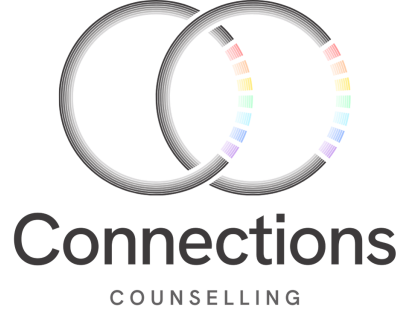Value 4 - Active Self-Care:
Counselling Insights on When to Pause, How to Recharge and Why It Matters.
What Is Care, and How Do You Apply It to Yourself? 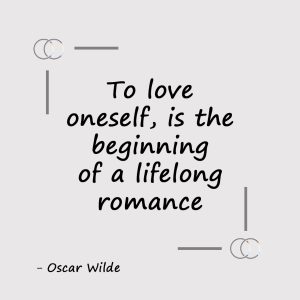
Active self-care isn’t about spa days or bubble baths, it’s about knowing when to pause, how to recharge, it’s about nurture and growth. This is why it matters for your wellbeing. At Connections Counselling CIC in Edinburgh, we support people locally and through online counselling across the UK to discover sustainable ways of looking after themselves.
Helping yourself means you have more to give to others. If your battery is low, how much energy do you really have to share? On planes, we’re told to put on our own oxygen mask first because you can’t help those beside you if you can’t breathe yourself.
When I started Connections in March, I also faced the devastating loss of my nine-year-old Labrador, Skye, to cancer. It was brutal. The excitement of starting something I’d spent three years training for collided with the utter devastation of losing a beloved companion. Skye was like a daughter to me. I took time away from client work, recognising that I couldn’t offer empathy when I needed emotional support myself. To have worked with clients at that time would have been irresponsible, even potentially damaging for both them and me.
Knowing when to stop and give yourself kindness is a vital part of self-care. Six months later, I am still hurting from losing Skye but I have given myself enough space and care to face this loss and be fully present for client work again. That is the difference active self-care makes: it allows us to honour pain and keep moving.
Rest Isn’t Always Recharge: Self-Care Beyond Relaxation

Time to yourself is important, but relaxing isn’t the same as recharging. It’s like putting your phone down at 10% battery and leaving it on the table for a few hours. When you pick it up again, the battery is still at 10%. Nothing has changed.
So how do you proactively recharge? It’s different for everyone, but there are some essentials you can put in place without drastic change. Start with the basics: sleep, diet, exercise. They may sound obvious, but they are the cornerstones of wellbeing.
You don’t need radical overhauls. Real self-care is less about grand gestures and more about rhythm, balance and persistence. Slow and steady really is the way. In an age of instant everything, it is often the act of slowing down that creates a greater efficiency and focus, which in turn can actually make you go faster and feel stronger.
If you don’t have a self-care plan in play, small red flags can start appearing. Ignore them and before long you’re at the centre of the “burnout gala-day red-flag parade,” waving your “I can do this!” banner without realising you’re marching toward a cliff.
Recognising Your Red Flags: Preventing Burnout with Counselling Support 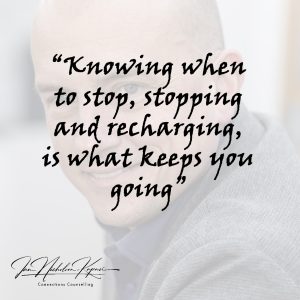
We all know the term “red flags” but do you know your own? Are you aware enough to see the signs your body and brain are showing you? Can you listen when your system is whispering for help, what about when it starts shouting?
Key red flags include:
- Persistent exhaustion
- Irritability, restlessness, or mood swings
- Emotional numbness or indifference
- Excessive worry or fear
- Difficulty concentrating or frequent forgetfulness
- Changes in sleep or appetite
- Ongoing headaches, stomach aches, or vague pains
- Neglecting personal hygiene
- Social withdrawal or isolation
- Chronic procrastination or struggling with daily tasks
These signs are not weaknesses, they’re signals. They are the smoke before the fire. Recognising them early is actually a gift, allowing you the opportunity to step back, pause and take action before burnout takes hold.
Self-Serving, Not Selfish: Why Active Self-Care Strengthens Relationships 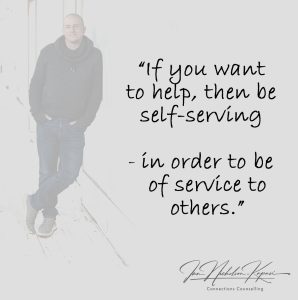
People often confuse self-care with selfishness. They are not the same — in fact, they are often opposites. A mantra I once held which still rings true is: “Self-serving, in order to be of service to others.”
As a family man and company director, my wellbeing is deeply tied to others. I am in co-dependent relationships with my family, my colleagues and my clients. If I don’t look after myself, I can’t hold up my part of the relationship. Worse still, if I pretend everything is fine when it isn’t, I risk weakening the very connections I’m trying to protect.
Saying “I’m fine” when we are not, is one of the most damaging things we can do. We may believe we are sparing others worry, moaning or avoiding weakness, but in truth we are being inauthentic, and inauthenticity is exhausting. It keeps us hiding, drains energy, and quietly erodes not only trust but also ourselves from the inside out.
Living authentically, acknowledging when you’re low, asking for support, admitting when things are not okay, is far better than soldiering on in silence.
Becoming Your Own Best Friend: The Role of Self-Worth in Mental Health 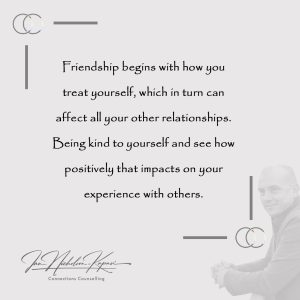
Another vital part of self-care is how we treat ourselves. Many of us don’t give ourselves enough value or worth to justify care. We pour love into others but withhold it from ourselves.
Learning to be your own best friend is transformative. Imagine treating yourself with the same compassion, patience, and generosity you’d show your child, partner, closest friend or in the same way you would like to be treated by others. I think it is known as the Golden Rule (originating from the New Testament) “Do unto others as you would have them do unto you" and I would offer a reframe and switch round “others” for “self”, to treat yourself in the same way that you would like to be treated. Oscar Wilde put it beautifully: “To love oneself is the beginning of a lifelong romance.”
But why don’t we do this naturally? For many, it comes down to the stories and consequent belief systems we’ve inherited about worth, about strength, about not being a burden. In counselling, these themes of value and self-worth surface again and again. Unpicking them is part of the journey toward genuine care.
Friendship begins with how you treat yourself, which in turn can affect all your other relationships. Being kind to yourself and see how positively that impacts on your experience with others.
Practices of Self-Care: Building Connection with Self, Others, and Community
Self-care takes many forms. Think of it in terms of connection: with self, with others, and with groups.
Connection to Self 
- Movement & grounding: exercise, walking, yoga.
- Reading: for pleasure or learning.
- Music: listening, playing, or singing.
- Nature: gardening, hiking, sitting under a tree.
- Solitude: journaling, reflecting, or meditating.
- Counselling or coaching: exploring rupture, repair, and growth.
- Body awareness: noticing sensations, tension, warmth, or aches.
- Laughter & play: reconnect with your inner child.
- Creativity: write, draw, build, or paint for the joy of creating.
- Boundaries: saying “no” when needed.
- Food: cook nourishing meals, eat slowly.
- Kindness: small acts that ripple out.
- Seeking support: asking for help, even before you think you “need” it.
Connection to Others
- Share practices with a friend or loved one.
- Reach out to someone you haven’t spoken to in a while.
- Smile at strangers, these small gestures ripple out.
Connection to Groups
- Try the above in community.
- Join a club, class, or group.
- Surround yourself with people who lift you up rather than drain you.
If you’re unsure how to begin, try asking any online search engine’s AI and see what comes up.
Minimising Disconnection: Screen Balance for Mental Health
One overlooked element of self-care is reducing disconnection. By this I mean the time we lose to screens: phones, tablets, computers, TV, VR. They pull our focus, narrow our attention, and drain our energy.
Screens aren’t bad, they’re part of modern life. I’ve lost hours doom-scrolling and years to computer games myself, but balance matters. A simple practice: avoid screens for the first hour after waking and the last hour before bed. Those two hours reclaimed can transform energy, sleep, mood and even provide a greater sense of self-worth.
Closing Thoughts: Why Counsellors Need Self-Care Too

To function well, with energy, compassion, and authenticity, get to know yourself, be kind to yourself, learn to respect and love yourself.
If you struggle with this, a counsellor can help you explore what gets in the way and how to move toward a fuller life. At Connections Counselling in Edinburgh and online across the UK, we believe in this so deeply that every counsellor is required to have a personal self-care plan and to actively use it. Because cared-for counsellors offer deeper, safer, and more authentic care.
So perhaps it’s time to remember the old fable. In today’s fast-paced, Hare-like world, can you choose to be the tortoise, not just to relax, but to truly recharge?
- Ian Nicholson-Kapasi (he/Him)
(As a neurodivergent individual, I use AI to read through my work and suggest edits where necessary)

